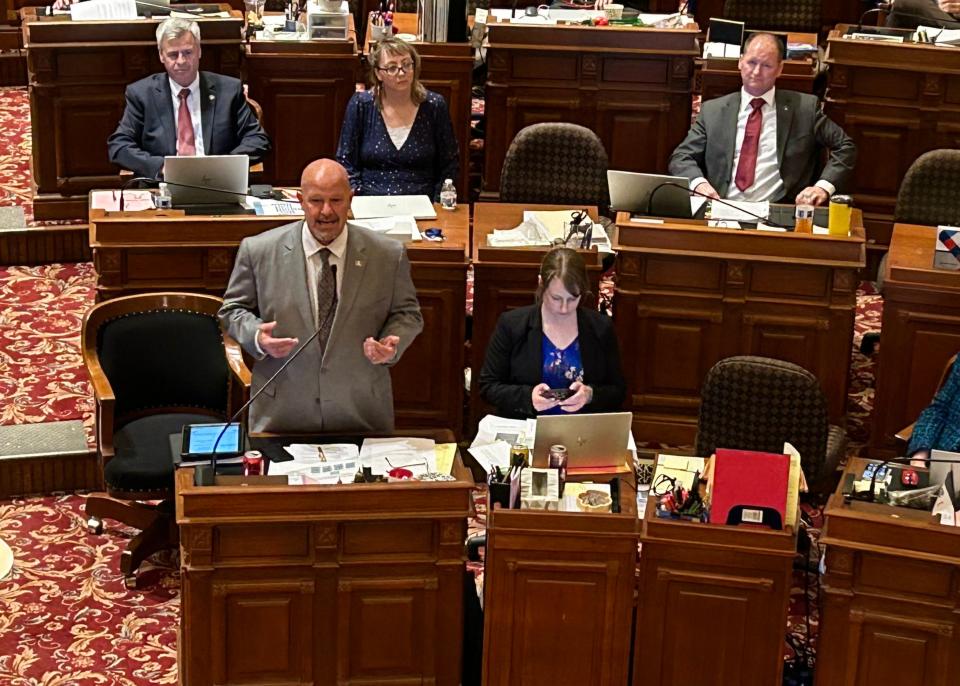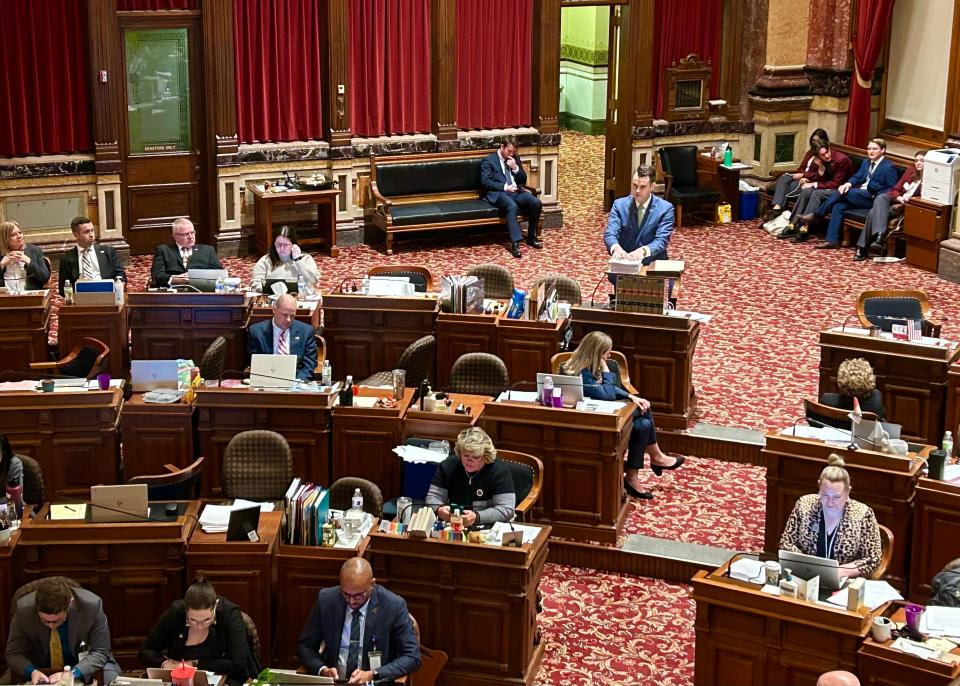Senate passes Kim Reynolds' bill to overhaul Iowa agencies. Which will lose positions?
- Oops!Something went wrong.Please try again later.
Iowa senators have approved a massive bill to reorganize the state's government, shrink the number of cabinet-level agencies and give Gov. Kim Reynolds more power over appointments, firings and salaries of state employees.
The Senate voted 34-15 Tuesday to pass Senate File 514, with every Republican voting in favor and all but one Democrat opposed. The House has yet to vote on its version of the legislation.
The 1,542-page bill is a priority for Reynolds, who has called for shrinking government and streamlining the way it offers services.
"It's second nature to reassess your operations. Unfortunately, government isn't always so diligent. So my bill will take our executive branch agencies from 37 agencies — which, by the way, is significantly more than both our neighbors and best practices — and it will reduce them to 16 executive state agencies," Reynolds said Tuesday morning. "And the result will be a state government that is aligned with the only reason it exists, and that truly is serving Iowans."
More:Does Kim Reynolds' plan to reshape Iowa government give her too much power? We break it down
But Democrats said the bill amounts to a power grab by Reynolds, who would have the power to fire more high-level positions at will, and to set the salaries of her cabinet-level agency directors without limits.
"Now you can sugarcoat this all you want tonight and call it streamlining, government reorganization, but it is a power grab," said Sen. Pam Jochum, D-Dubuque.
The bill's floor manager, Sen. Jason Schultz, R-Schleswig, said the bill is about making the state's executive branch more responsive and more accountable to the governor.
"This is not a power grab, it’s her branch. It is the next governor’s branch," Schultz said. "They’re going to have the ability to control, to answer for and to report to the people of Iowa what they’re doing in a more consistent, evenhanded, accountable manner."

Throughout more than 2½ hours of debate, Senate Democrats unsuccessfully offered 11 amendments to keep the structure of certain state departments intact and preserve the independence of state employees.
"Democrats support streamlining government, but we also support, at the same time, a responsive government," said Sen. Tony Bisignano, D-Des Moines.
Bisignano was the lone Democratic vote in favor of the bill, arguing that he wants to work with the House to make some of the changes Democrats have been seeking.
More:This Iowa agency is the blueprint for Kim Reynolds' consolidation plan. How has it worked?
One amendment that senators did accept Thursday was to restore the two-thirds requirement for Senate confirmation of the governor's nominees.
An earlier version of the Senate's bill would have lowered the threshold for confirming nominees of the governor from 34 to 30 votes in the 50-member chamber.
How much money will the bill save? Which departments could lose positions?
Reynolds and Republican lawmakers have said the mergers will happen without laying off any state employees.
An analysis from the nonpartisan Legislative Services Agency estimates that the reorganization would result in the elimination of 214 full-time equivalent positions and result in $12.4 million less in spending per year.
About half the reduction in spending, $6.4 million, would be from the state's general fund, while $5.8 million of the reduction would come from federal funds and $196,000 from other funds, according to the analysis.
An earlier estimate from Reynolds predicted the bill would eliminate 513 currently vacant positions and save $18 million this year, $3 million of which would come from the state's general fund.
Schultz, in his closing comments, gave similar figures to Reynolds.
"It does not fire or lay off anybody," he said of the bill. "Attrition will be actually used in the actual human resources portion, but over 500 empty slots are going to be identified and removed."
More:Kim Reynolds' 1,500-page bill would overhaul Iowa state government. Here's how it would work
Here's how those positions break down among different state agencies, according to the Legislative Services Agency's analysis.
Department of Health and Human Services
The new Health and Human Services department would eliminate 110 unfilled full-time-equivalent positions as it absorbs a variety of other state departments, the analysis estimates.
That would result in a cost reduction of $6.4 million, of which $4.4 million would come from federal funds and $2 million would come from the state's general fund.
Department of Inspections, Appeals and Licensing
Reorganizing the Department of Inspections, Appeals and Licensing is expected to eliminate 20 full-time-equivalent positions, the Legislative Services Agency's analysis states.
"The department has not identified whether these positions are filled or unfilled," the LSA analysis states.
That will result in a drop in spending of $1.6 million for the department, of which $1.4 million will be federal funds and $162,000 will be state funds.

Iowa Economic Development Authority, Department of Cultural Affairs, Iowa Finance Authority
Placing the Department of Cultural Affairs under the Iowa Economic Development Authority will eliminate five positions within the Department of Cultural Affairs, at a cost reduction of about $356,000 annually.
Merging IEDA with the Iowa Finance Authority will eliminate another 14 positions, half of which were funded. That will save the state about $140,000 per year.
Altogether, the new structure of the Iowa Economic Development Authority is expected to reduce state costs by $496,000, of which $300,000 would come from the state's general fund. The rest of the money would come from the Rebuild Iowa Infrastructure Fund and federal grants.
Public Employment Relations Board
The bill would reorganize the Public Employment Relations Board, which is comprised of three salaried members who are appointed by the governor.
The bill would create an executive director of the board, appointed by the governor, at a cost of $157,000, while moving the three board members from full-time positions to part-time positions, paid on a per diem basis, saving $277,000.
The net effect of the changes would reduce state costs by about $120,000, the Legislative Services Agency estimates.
Iowa Workforce Development
Reorganizing Iowa Workforce Development is expected to reduce state spending by $4.2 million per year by eliminating 63 funded positions and four unfunded positions. The LSA analysis says the department has not identified whether the positions are filled.
Of the 63 positions, 39 would be from Iowa Workforce Development, reducing spending by $2.9 million; 25 would be from Vocational Rehabilitation Services, reducing spending by $1.2 million; and three would be from other programs, reducing spending by $72,000.
Iowa Department of Education
Changes to the Department of Education would add one division administrator position at a cost of $144,000.
Board of Parole
Changes to the Board of Parole would cost the state an additional $200,000 annually by changing three part-time members of the board to full-time salaried positions. Two of the board's five members are already salaried.
Des Moines Register reporter Katie Akin contributed reporting.
Stephen Gruber-Miller covers the Iowa Statehouse and politics for the Register. He can be reached by email at sgrubermil@registermedia.com or by phone at 515-284-8169. Follow him on Twitter at @sgrubermiller.
This article originally appeared on Des Moines Register: Iowa Senate passes Kim Reynolds' bill to reshape state government

